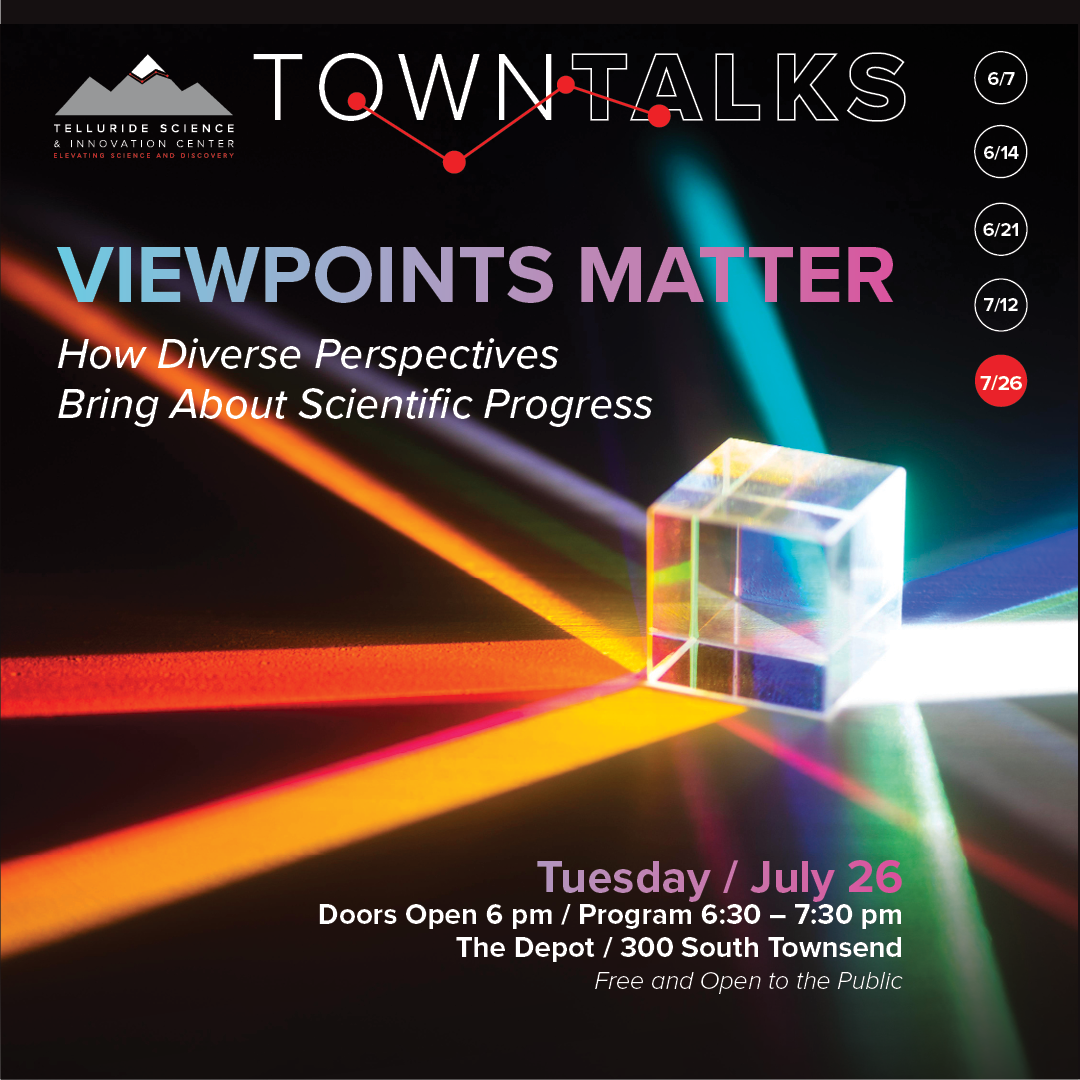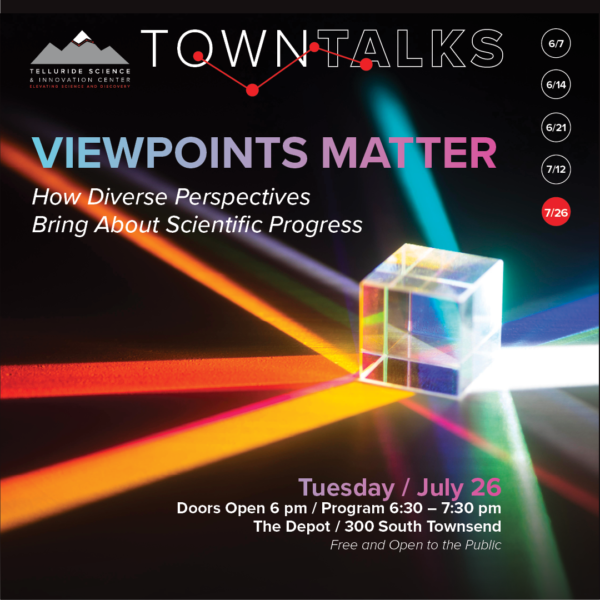
23 Jul Telluride Science Town Talk: “Viewpoints Matter, How Diverse Perspectives Bring About Scientific Progress,” 7/26!
The next (and final) Telluride Science Town Talk of the summer season takes place at the historic Telluride Depot, the new home of Telluride Science. The event is scheduled for Tuesday, July 26, 2022, 6:30pm. Doors at 6pm. The talk is titled “Viewpoints Matter: How Diverse Perspectives Bring About Scientific Progress.” The conversation will be moderated as always by Emmy and Peabody award-winning journalists Judy Muller and George Lewis.
Visit telluridescience.org to learn more about Telluride Science and the capital campaign to transform the historic Telluride Depot into the Telluride Science & Innovation Center, a permanent home for Telluride Science and a global hub of inspired knowledge exchange and development where great minds solve great challenges.
Go here for more on Telluride Science.

Returning to the historic Telluride Depot this week, Telluride Science will address the ever-present topic of diversity and representation in the scientific community. This issue is often highly politicized and can bring about strong reactions when discussed publicly.
The final Town Talk of the season: “Viewpoints Matter: How Diverse Perspectives Bring About Scientific Progress” will be held at 6:30pm on Tuesday July 16th at the Depot, 300 S. Townsend St. This talk features three scientists who have made large impacts in their communities: Korana Burke, Dontarie Stallings, and Peter Salamon are the panelists, with Emmy and Peabody award-winning journalists Judy Muller and George Lewis returning to moderate.
Dr. Korana Burke from the University of California Davis focuses on equity within the individual classroom, making sure her students have the resources to succeed, regardless of their backgrounds. That involves anything from laying out a detailed syllabus to offering snacks during office hours. These easy-to-implement ideas benefit first-generation students who may not have the support system at home to guide them through their university experience.

Dr. Korana Burke
Dr. Burke is also partner to UC Davis’s Special Transition Enrichment Program (STEP), which allows UC Davis applicants who might have a tough time during the high school to university transition to come to campus early and begin their adjustment into college life. She also started the Society of Industrial and Applied Mathematics’ Student Feature, which aims to highlight the research and accomplishments of students who do not fit the stereotypical version of a mathematician.
Dr. Dontarie Stallings from the University of California San Diego adds another layer of discussion to the topic. After receiving his doctorate from the University of Alabama as one of the first Black Chemistry PhD graduates from the program, he recognized an issue with diversity in the STEM field during his time as the only black faculty member in the chemistry department at Georgia Southern University. That led to Dr. Stallings serving as a mentor to many minority students, helping them navigate the difficulties of being a minority in STEM.

Dr. Dontarie Stallings
In addition to his position as an Assistant Teaching Professor in the Chemistry and Biochemistry department of UCSD, Dr. Stallings serves as Faculty Director of the UCSD Physical Science Cohort Program and Associate Director for the Open Chemistry Collaborative in Diversity Equity (OXIDE). Along with OXIDE Director, Rigoberto Hernandez, a long-time Telluride Science participant, Stallings works with research scientists, social scientists, and industry scientists to create individualized approaches for increasing diversity and inclusion in STEM, helping minority students overcome the systemic barriers within scientific fields. He hopes this talk will open discussion about diversity in science, with the purpose of pushing science to be the best that it can be.
Rounding out the panel, San Diego State University’s Dr. Peter Salamon, a co-founder of Telluride Science, adds his perspective on the importance of diversity. Working in the field of thermodynamics, he has been able to quantify and describe the energy that is wasted from various energetic systems. He focuses on diversity of scientific fields, often holding workshops with various different types of scientists to get a different approach to a problem. Dr. Salamon has noticed, in many cases, that a lack of different perspectives often hinders scientific advancements and that including someone with a different background will almost always be beneficial to forward progress.

Dr. Peter Salamon
This vision is consistent with the work that Telluride Science does to this day.
Telluride Science represents over 5,000 scientists from over 500 international and domestic institutions and serves as a major hub for scientific research and innovation. A hallmark of Telluride Science workshops is a mixture of disciplines and perspectives combined with inherent respect for co-participants.
“Bringing together different fields of study that might be able to help each other often does,” adds Salamon.


Sorry, the comment form is closed at this time.